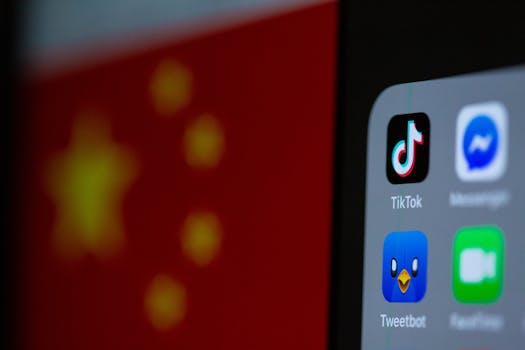Communication Services

Title: Trump's Bold Move: Proposes TikTok Sale to China in Exchange for Tariff Relief
Content:
Trump's Strategic Proposal: Selling TikTok to Ease Tariff Tensions
In a surprising turn of events, President Donald Trump has proposed a deal that could reshape the landscape of international trade and digital ownership. The proposal involves selling the popular social media platform TikTok to China in exchange for tariff relief. This move comes amidst ongoing trade tensions between the United States and China, and it has sparked a flurry of discussions and debates across various sectors.
The Background of the TikTok-China Tariff Deal
The relationship between the United States and China has been strained for years, primarily due to trade disputes and tariffs. The Trump administration has imposed significant tariffs on Chinese goods, leading to retaliatory measures from China. Amidst this backdrop, TikTok, a social media app owned by the Chinese company ByteDance, has become a focal point of contention.
- TikTok's Popularity and Security Concerns: TikTok has gained immense popularity worldwide, but it has also faced scrutiny over data privacy and national security concerns. The U.S. government has expressed worries about the potential for the Chinese government to access user data through the app.
- Previous Attempts to Ban TikTok: In response to these concerns, the Trump administration previously attempted to ban TikTok in the United States. However, these efforts were met with legal challenges and public backlash.
Trump's Proposal: A New Approach to Resolving Trade Issues
President Trump's latest proposal suggests a different approach to resolving the ongoing trade issues. By offering to sell TikTok to China, Trump aims to leverage the app's value to negotiate tariff relief. This proposal has several key components:
- Sale of TikTok: The U.S. would facilitate the sale of TikTok to a Chinese entity, potentially ByteDance or another approved buyer.
- Tariff Relief: In exchange, China would agree to reduce or eliminate tariffs on U.S. goods, providing relief to American businesses and consumers.
- Data Security Measures: The deal would include stringent data security measures to address U.S. concerns about privacy and national security.
Potential Benefits and Challenges
The proposed deal could have significant implications for both countries and the global economy. Here are some potential benefits and challenges:
Benefits:
Economic Relief: Tariff relief could provide much-needed economic relief to U.S. businesses and consumers, potentially boosting economic growth.
Resolution of Trade Disputes: The deal could pave the way for a broader resolution of trade disputes between the U.S. and China.
Strengthened Bilateral Relations: A successful deal could improve bilateral relations and foster greater cooperation between the two nations.
Challenges:
Data Privacy Concerns: Ensuring robust data privacy and security measures will be crucial to gaining public and political support for the deal.
Legal and Regulatory Hurdles: The sale of TikTok would need to navigate complex legal and regulatory frameworks in both countries.
Public and Political Backlash: The proposal could face significant opposition from those who view it as a compromise on national security.
Reactions and Responses
The proposal has elicited a range of reactions from various stakeholders:
- U.S. Government Officials: Some officials have expressed cautious optimism about the potential for tariff relief, while others remain skeptical about the implications for national security.
- Chinese Government: China has yet to officially respond to the proposal, but there is speculation that it could be open to negotiations if the terms are favorable.
- Business Leaders: U.S. business leaders have expressed interest in the potential for tariff relief, but they are also concerned about the long-term implications of selling TikTok.
- Public Opinion: Public opinion is divided, with some supporting the deal as a means to ease economic pressures and others opposing it due to concerns about data privacy and national security.
The Future of the TikTok-China Tariff Deal
The future of Trump's proposal remains uncertain, but it has undoubtedly sparked a new round of discussions and negotiations. Here are some key factors that will influence the outcome:
- Negotiations and Diplomacy: Successful negotiations between the U.S. and China will be crucial to reaching a deal. Both sides will need to find common ground on the terms of the sale and the extent of tariff relief.
- Legal and Regulatory Approvals: The deal will need to pass legal and regulatory scrutiny in both countries. This could involve lengthy processes and potential roadblocks.
- Public and Political Support: Gaining public and political support will be essential for the deal to move forward. This will require addressing concerns about data privacy and national security.
Conclusion: A Bold Move with Far-Reaching Implications
President Trump's proposal to sell TikTok to China in exchange for tariff relief is a bold move that could have far-reaching implications for international trade, digital ownership, and bilateral relations. While the proposal faces significant challenges, it also offers potential benefits that could help ease economic tensions and foster greater cooperation between the U.S. and China.
As the situation continues to evolve, it will be important to monitor developments and assess the potential impact on various stakeholders. Whether this proposal will lead to a successful deal remains to be seen, but it has undoubtedly added a new dimension to the ongoing trade discussions between the United States and China.
In the coming weeks and months, the world will be watching closely to see how this bold proposal unfolds and what it means for the future of TikTok, U.S.-China relations, and the global economy.




















